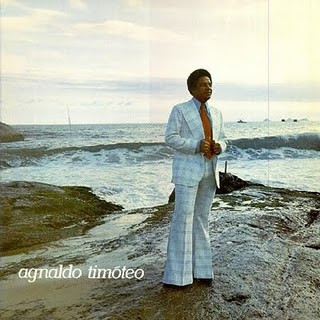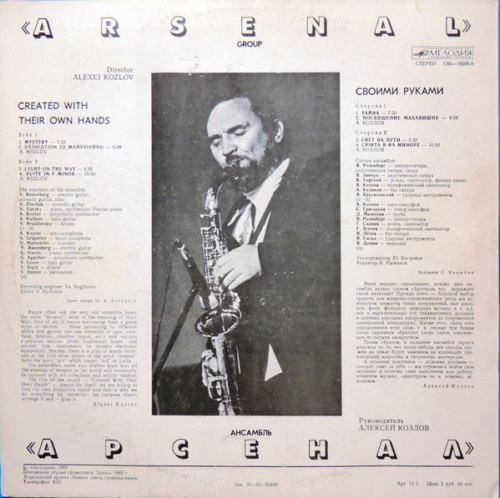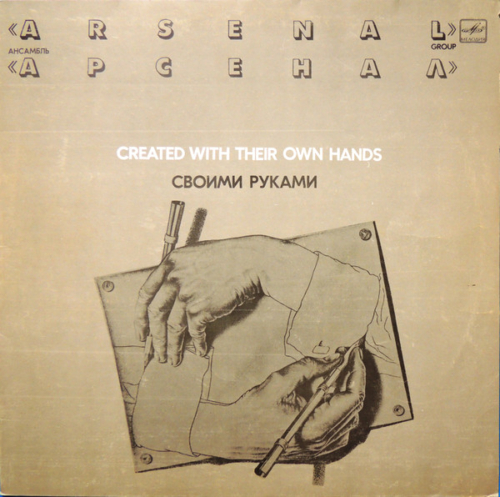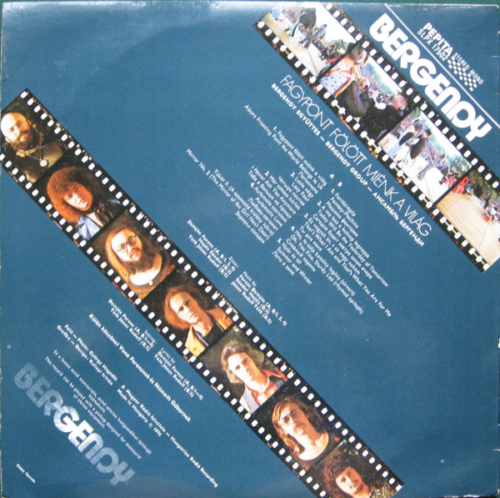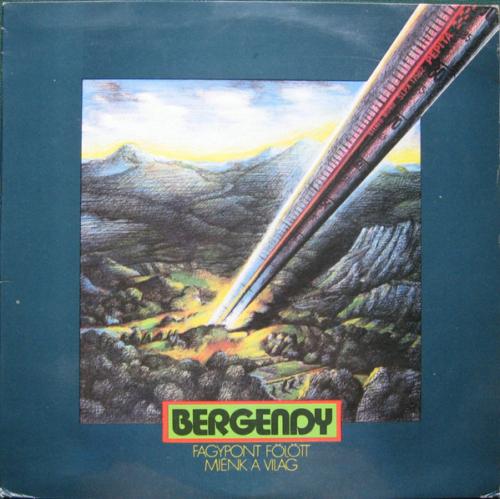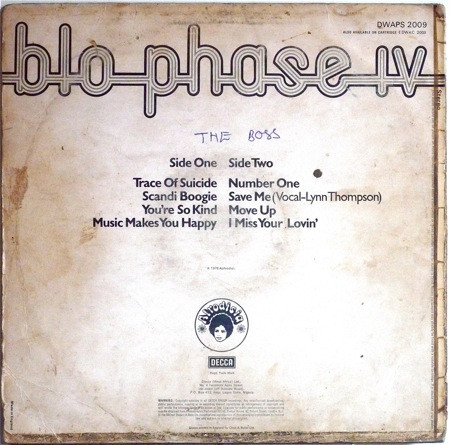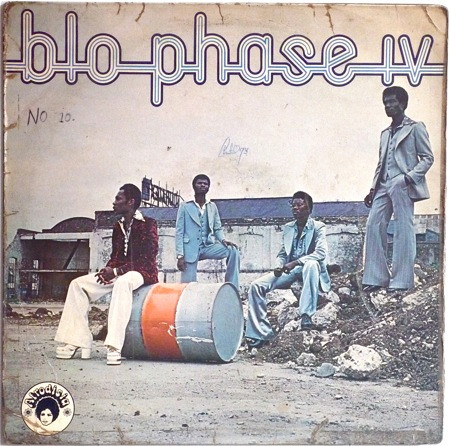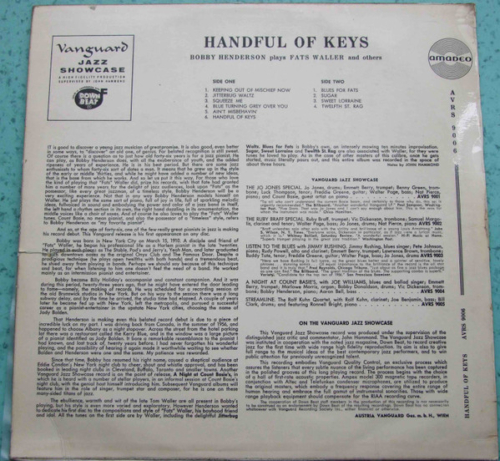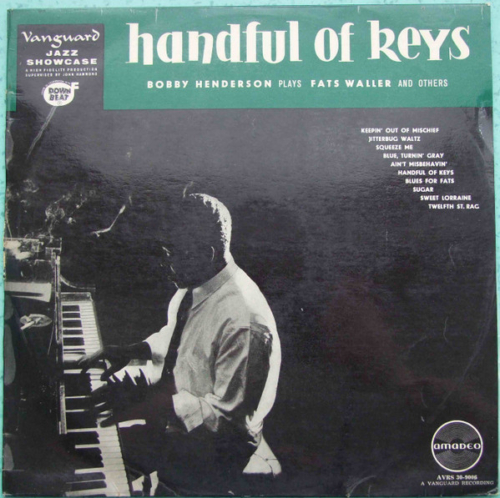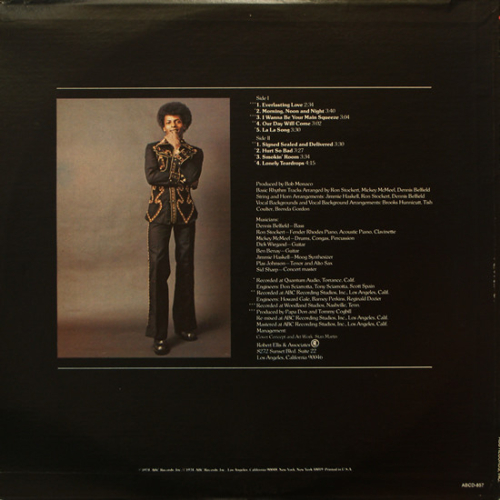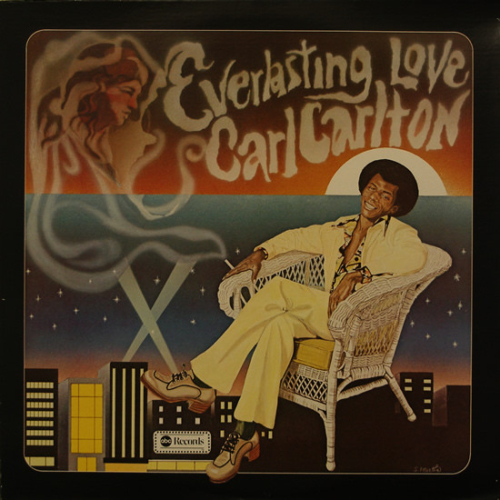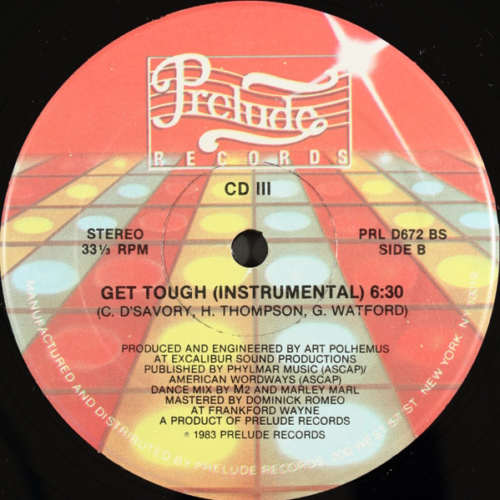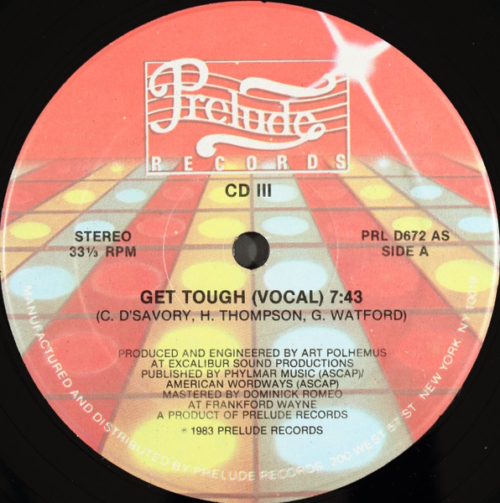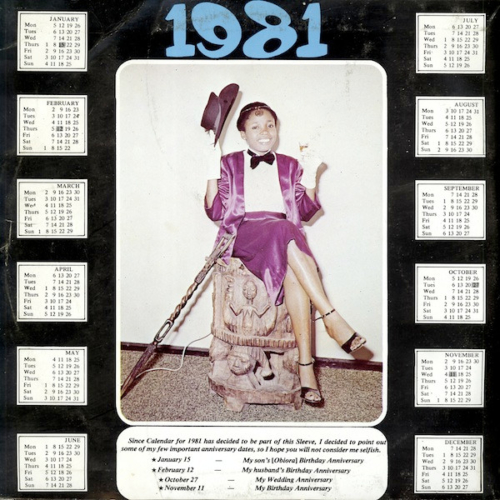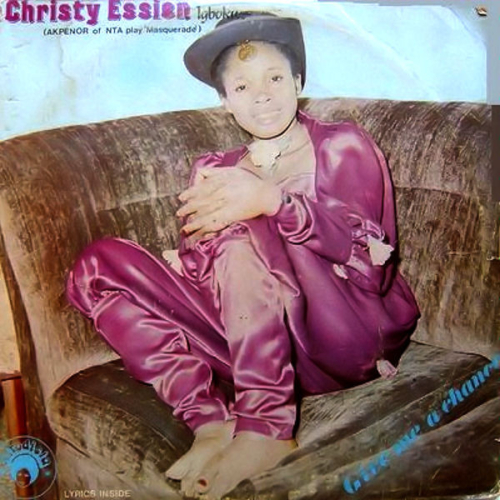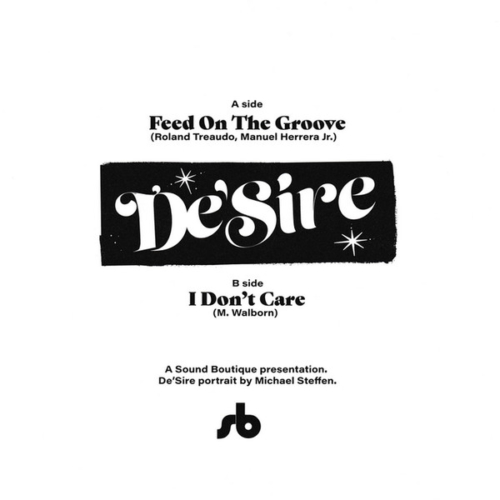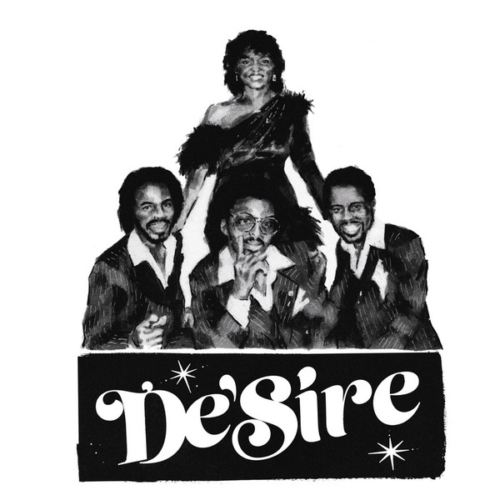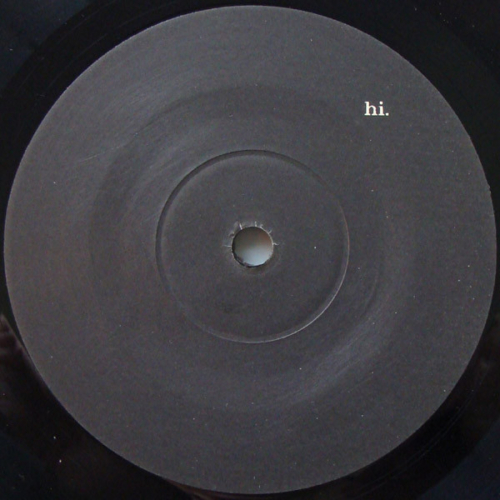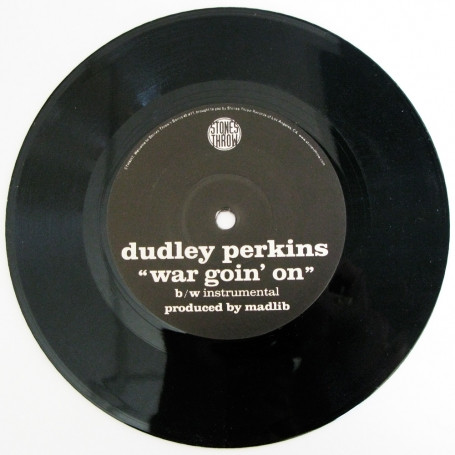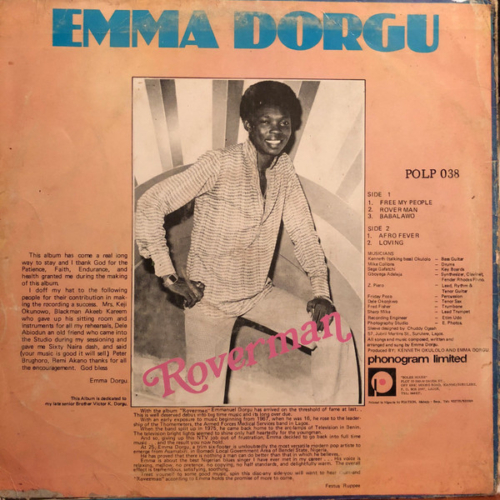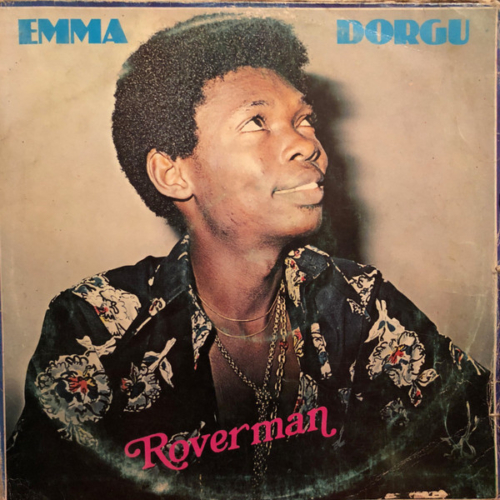-
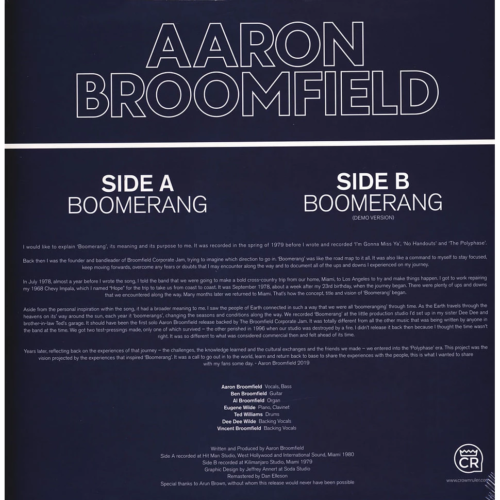
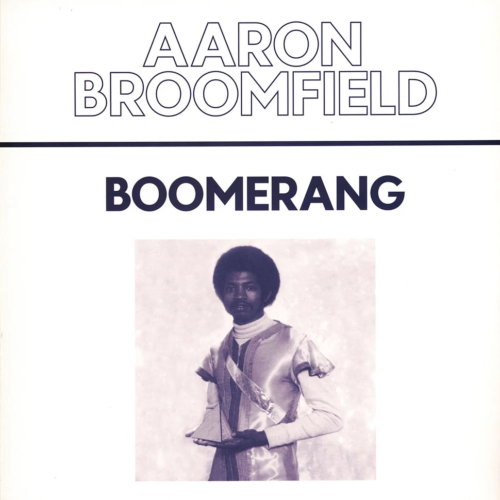 Crown Ruler Records returns with a slab of unreleased disco-funk from Miami musician, Aaron Broomfield. HEAVY tune, in two mixes.. TIP. “Boomerang” was first recorded in 1979, when the Broomfield Corporate Jam leader was attempting to plot a solo career. It was the first cut Aaron Broomfield recorded under his own name – Initially, at the family band’s home studio, Kilimanjaro, and later at professional studios in L.A and Miami – but it was never released. “I always wanted to be able to share ‘Boomerang’ with my fans some day – I didn’t release it back then because I thought the time wasn’t right,” Broomfield explains. “It was so different to what was considered commercial then and felt ahead of its time.” Before deciding against releasing it, Broomfield had two test pressings made. It was the accidental discovery of the one remaining record by digger Arun Brown (the other perished when Broomfield’s Kilimanjaro studio was damaged by a fire in 1996) that set in motion the chain of events that finally led to its release. The jacket boasts a written essay by Broomfield himself, telling the remarkable story behind the song. The wax features the two versions of Boomerang, of which both were meticulously restored and re-mastered by celebrated Australian sound engineer, Dan Elleson. Head to side A for the “test press” version, a cosmic, starry-eyed chunk of elastic Miami disco-funk where the Broomfield family’s killer instrumentation – all rubbery bass, deep space synths and crunchy Clavinet motifs – arcs around the sound space like a boomerang in flight. The vocal arrangement, in which Aaron Broomfield’s conscious lyrics come through loud and clear, brings it home. On the flipside, you’ll hear how dynamic the band was through the “Demo Version” - a relaxed, loose and spacey groover that sounds as ahead of its time in 2018 as it would have when it was recorded in 1979.
Crown Ruler Records returns with a slab of unreleased disco-funk from Miami musician, Aaron Broomfield. HEAVY tune, in two mixes.. TIP. “Boomerang” was first recorded in 1979, when the Broomfield Corporate Jam leader was attempting to plot a solo career. It was the first cut Aaron Broomfield recorded under his own name – Initially, at the family band’s home studio, Kilimanjaro, and later at professional studios in L.A and Miami – but it was never released. “I always wanted to be able to share ‘Boomerang’ with my fans some day – I didn’t release it back then because I thought the time wasn’t right,” Broomfield explains. “It was so different to what was considered commercial then and felt ahead of its time.” Before deciding against releasing it, Broomfield had two test pressings made. It was the accidental discovery of the one remaining record by digger Arun Brown (the other perished when Broomfield’s Kilimanjaro studio was damaged by a fire in 1996) that set in motion the chain of events that finally led to its release. The jacket boasts a written essay by Broomfield himself, telling the remarkable story behind the song. The wax features the two versions of Boomerang, of which both were meticulously restored and re-mastered by celebrated Australian sound engineer, Dan Elleson. Head to side A for the “test press” version, a cosmic, starry-eyed chunk of elastic Miami disco-funk where the Broomfield family’s killer instrumentation – all rubbery bass, deep space synths and crunchy Clavinet motifs – arcs around the sound space like a boomerang in flight. The vocal arrangement, in which Aaron Broomfield’s conscious lyrics come through loud and clear, brings it home. On the flipside, you’ll hear how dynamic the band was through the “Demo Version” - a relaxed, loose and spacey groover that sounds as ahead of its time in 2018 as it would have when it was recorded in 1979. -
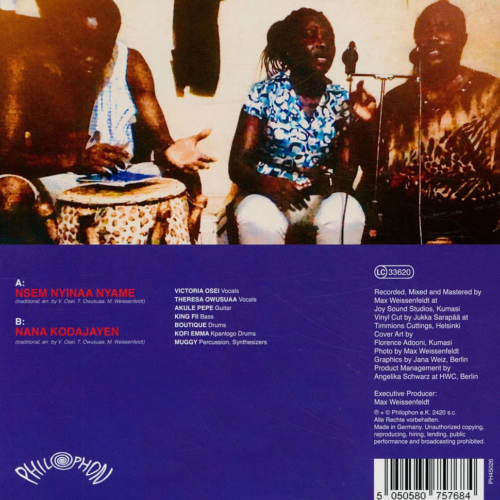
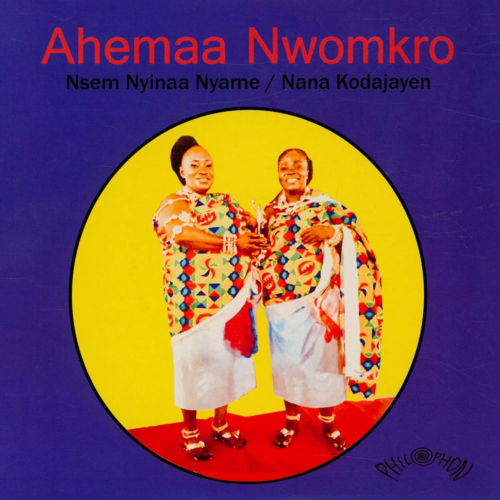 Ahemaa Nwomkro, which means queens of Nwomkro, are Victoria Osei and Theresa Owusuaa. Nwomkro is an old Ashanti musical style, which played an influential role in the origin of the typical more roots-like Highlife style of Kumasi, the cultural capital of Ghana in the middle of the jungle. On this release the two singers have teamed up with the young generation of Highlife muicians of Kumasi. On guitar is Akule Pepe, who served for years in the group of Highlife legend Alex Konadu, the most on demand band in its time. The two songs are a rare example of how good pure Nwomkro gets together with typical Highlife.
Ahemaa Nwomkro, which means queens of Nwomkro, are Victoria Osei and Theresa Owusuaa. Nwomkro is an old Ashanti musical style, which played an influential role in the origin of the typical more roots-like Highlife style of Kumasi, the cultural capital of Ghana in the middle of the jungle. On this release the two singers have teamed up with the young generation of Highlife muicians of Kumasi. On guitar is Akule Pepe, who served for years in the group of Highlife legend Alex Konadu, the most on demand band in its time. The two songs are a rare example of how good pure Nwomkro gets together with typical Highlife. -
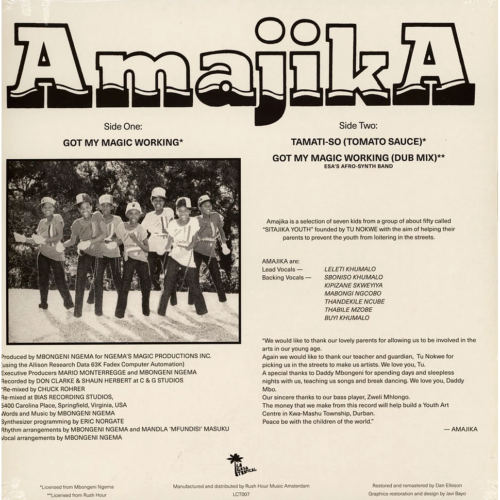
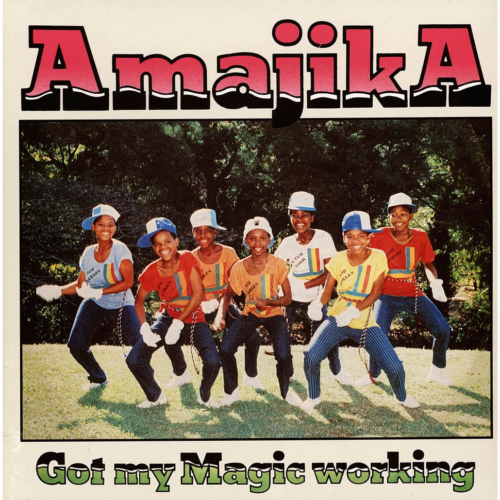 Heavy South African cut, unearthed by Dene from LCT, All about the massive title track ''Got My Magic Working''... Phat bassline, machinegun claps dipped in acid! The origins of Amajika is a tale of two worlds colliding at the perfect moment and begin in KwaMushu Township outside Durban. Here would be where a young Tu Nokwe would set up a school to help teach other aspiring youngsters like herself in music, dance and acting. This would become known as the Amajika Youth and Children’s Art Project and would be run from the Nokwe home, a common hangout for artists at the time. Some boast 2000+ pupils going through this program while others claim it wasn’t more than a backyard dance group, but for the lucky group of kids that were members in the mid 80s it would be their chance at stardom. It was during these years that a young aspiring playwright and musician Mbongeni Ngema had come across Tu and her group of gifted youngsters at the Nokwe family home. Although he was touring extensively at the time with the plays Woza Albert and Asinamali, the latter which eventually ended up on broadway, he would spend any time off from the tour with Tu and her dance troop. After being inspired by the American group New Edition, Mbongeni envisioned Amajika as the South African answer and decided to bankroll a studio session. The session would take place in a private studio in Durban.The release of the first single would follow very shortly. The lead track, Tomati-So is a fun swinging groove over some basic programmed drums. The song is dedicated to Tu Nokwe sings of her unique style and kind heart. On his next tour Mbongeni would take the remaining masters with him to the US and had the track remixed. Although it never materialized in a release States side he did return with the remixed tape and release it in South Africa the following year. Much like Tomato So the song was an ode and would be dedicated to the man who was making all their dreams come true. Got My Magic Working sings of going overseas and being a star on Broadway and TV and the man who is making it all happen. All these true predictions are sung on top of a groovy acid bass by a clearly matured troop of artists. During these years of working with Amajika, Mbongeni became very impressed with the exceeding talent of one of the members and decided to cast her in his upcoming musical Sarafina. The other children also wanted to be a part of the Broadway show but not everyone would get a role. This would be the end of Amajika as the next years would be dedicated to creating success on the musical stage. The growing kids that formed Amajika became young adults and pursued their own careers after the fact. Tu Nokwe would leave the country to return years later as the wife of Shaka Zulu on the big screen. To this day she is still very active both on stage and screen while Mbongeni is still writing and adding to the South African Musical Theatre catalog. Fast forward 30 years from the original release to a smokey club where ESA hears Got My Magic Working played by Rush Hours Store’s own Bonnefooi. Instantly he inquires about the track from his homeland and feels it a perfect addition the repertoire of the Afro Synth band he is quietly cooking up. The band’s instrumental take ended up as the B side on a mysterious and limited white label released by Rush Hour in early 2020 but quickly sold out. Here you have compiled the two title tracks from original Amajika singles along with the instrumental version by ESA’s Afro Synth Band for The complete Amajika experience, past to present.
Heavy South African cut, unearthed by Dene from LCT, All about the massive title track ''Got My Magic Working''... Phat bassline, machinegun claps dipped in acid! The origins of Amajika is a tale of two worlds colliding at the perfect moment and begin in KwaMushu Township outside Durban. Here would be where a young Tu Nokwe would set up a school to help teach other aspiring youngsters like herself in music, dance and acting. This would become known as the Amajika Youth and Children’s Art Project and would be run from the Nokwe home, a common hangout for artists at the time. Some boast 2000+ pupils going through this program while others claim it wasn’t more than a backyard dance group, but for the lucky group of kids that were members in the mid 80s it would be their chance at stardom. It was during these years that a young aspiring playwright and musician Mbongeni Ngema had come across Tu and her group of gifted youngsters at the Nokwe family home. Although he was touring extensively at the time with the plays Woza Albert and Asinamali, the latter which eventually ended up on broadway, he would spend any time off from the tour with Tu and her dance troop. After being inspired by the American group New Edition, Mbongeni envisioned Amajika as the South African answer and decided to bankroll a studio session. The session would take place in a private studio in Durban.The release of the first single would follow very shortly. The lead track, Tomati-So is a fun swinging groove over some basic programmed drums. The song is dedicated to Tu Nokwe sings of her unique style and kind heart. On his next tour Mbongeni would take the remaining masters with him to the US and had the track remixed. Although it never materialized in a release States side he did return with the remixed tape and release it in South Africa the following year. Much like Tomato So the song was an ode and would be dedicated to the man who was making all their dreams come true. Got My Magic Working sings of going overseas and being a star on Broadway and TV and the man who is making it all happen. All these true predictions are sung on top of a groovy acid bass by a clearly matured troop of artists. During these years of working with Amajika, Mbongeni became very impressed with the exceeding talent of one of the members and decided to cast her in his upcoming musical Sarafina. The other children also wanted to be a part of the Broadway show but not everyone would get a role. This would be the end of Amajika as the next years would be dedicated to creating success on the musical stage. The growing kids that formed Amajika became young adults and pursued their own careers after the fact. Tu Nokwe would leave the country to return years later as the wife of Shaka Zulu on the big screen. To this day she is still very active both on stage and screen while Mbongeni is still writing and adding to the South African Musical Theatre catalog. Fast forward 30 years from the original release to a smokey club where ESA hears Got My Magic Working played by Rush Hours Store’s own Bonnefooi. Instantly he inquires about the track from his homeland and feels it a perfect addition the repertoire of the Afro Synth band he is quietly cooking up. The band’s instrumental take ended up as the B side on a mysterious and limited white label released by Rush Hour in early 2020 but quickly sold out. Here you have compiled the two title tracks from original Amajika singles along with the instrumental version by ESA’s Afro Synth Band for The complete Amajika experience, past to present. -
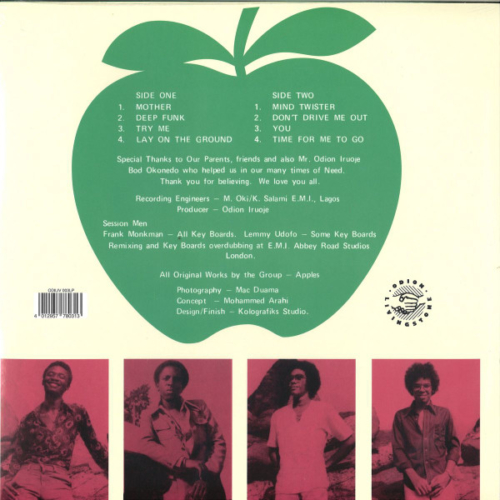
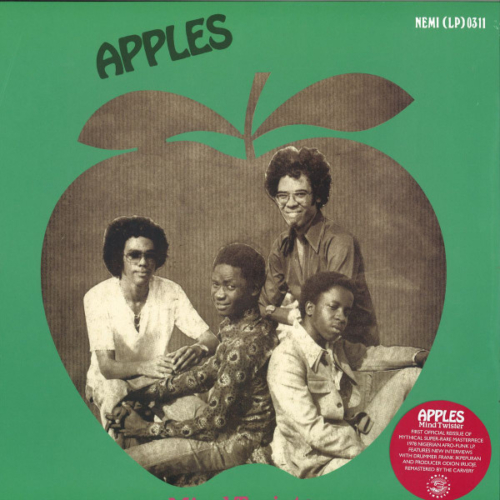 Odion Livingstone present another essential reissue from the Nigerian archives, the first ever international release of The Apples’ essential Afro-funk LP rarity ‘Mind Twister’.As part of the St Gregory’s student band scene in Lagos during the late ‘70s alongside Ofege, Grotto and more, Apples were picked up and produced by legendary EMI Nigeria producer Odion Iruoje who added overdubs to the album at Abbey Road in London with Curved Air keyboardist Francis Monkman. The band met and formed in Lagos. Bandleader Frank Ikpefuran teamed up with Georges Vieira from the American School and brothers Clifford and Gerard Nagi who were studying at “St Greg’s” in Lagos, and remembers, “I must have been 19 years old when I met Clifford. We used to hangout on Victoria Island, watching bands play and jamming with them. That’s how we met Georges. We all listened to Jimi Hendrix, Santana, Idris Muhammad and the Beatles.” “We started jamming with Clifford on the guitar, his brother Gerard on the bass and Georges on the guitar. We chipped in with song ideas, with the group contributing arrangements and refning things until we were satisfed. The band had a natural sound, which stemmed from the chemistry we had. It was a strange chemistry, we were an odd combination from different backgrounds but when we played, something happened…” After landing a residency at Tee Mac’s club in Surulere, Apples auditioned for Odion Iruoje who arranged recording dates and cut the record. For a young band, Iruoje was surprised by the quality of the band, adding in extra keyboard parts from Lemmy Udofa and Francis Monkman, founder of Curved Air and session man for Kate Bush, Sky and music libraries like BBC Music, Bruton and KPM. Iruoje remembers, “their playing added a layer of sophistication and sheen without encumbering proceedings.” This defnitive edition of Apples’ ‘Mind Twister’ features new interviews with bandleader Frank Ikpefuran and producer Odion Iruoje and has been fully remastered by The Carvery.
Odion Livingstone present another essential reissue from the Nigerian archives, the first ever international release of The Apples’ essential Afro-funk LP rarity ‘Mind Twister’.As part of the St Gregory’s student band scene in Lagos during the late ‘70s alongside Ofege, Grotto and more, Apples were picked up and produced by legendary EMI Nigeria producer Odion Iruoje who added overdubs to the album at Abbey Road in London with Curved Air keyboardist Francis Monkman. The band met and formed in Lagos. Bandleader Frank Ikpefuran teamed up with Georges Vieira from the American School and brothers Clifford and Gerard Nagi who were studying at “St Greg’s” in Lagos, and remembers, “I must have been 19 years old when I met Clifford. We used to hangout on Victoria Island, watching bands play and jamming with them. That’s how we met Georges. We all listened to Jimi Hendrix, Santana, Idris Muhammad and the Beatles.” “We started jamming with Clifford on the guitar, his brother Gerard on the bass and Georges on the guitar. We chipped in with song ideas, with the group contributing arrangements and refning things until we were satisfed. The band had a natural sound, which stemmed from the chemistry we had. It was a strange chemistry, we were an odd combination from different backgrounds but when we played, something happened…” After landing a residency at Tee Mac’s club in Surulere, Apples auditioned for Odion Iruoje who arranged recording dates and cut the record. For a young band, Iruoje was surprised by the quality of the band, adding in extra keyboard parts from Lemmy Udofa and Francis Monkman, founder of Curved Air and session man for Kate Bush, Sky and music libraries like BBC Music, Bruton and KPM. Iruoje remembers, “their playing added a layer of sophistication and sheen without encumbering proceedings.” This defnitive edition of Apples’ ‘Mind Twister’ features new interviews with bandleader Frank Ikpefuran and producer Odion Iruoje and has been fully remastered by The Carvery. -
Ausverkauft
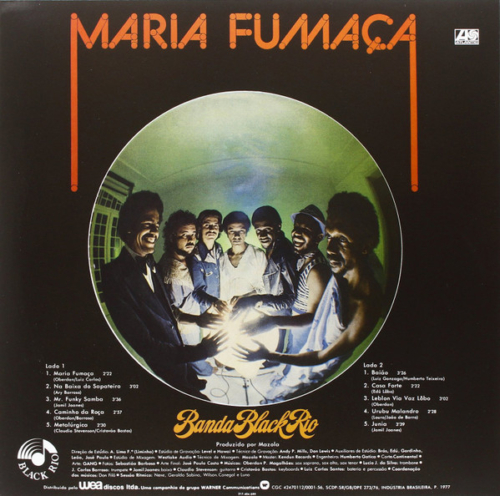
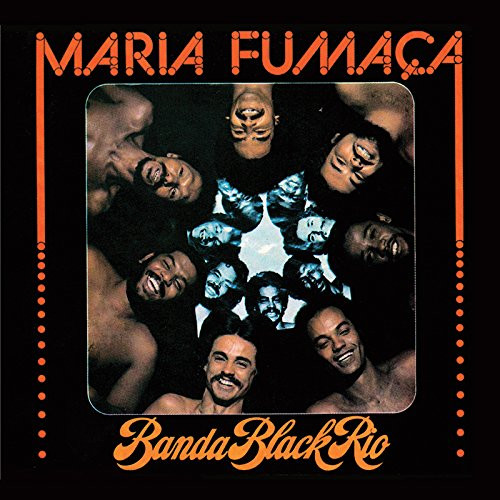 Used Vinyl VG+
Used Vinyl VG+ -
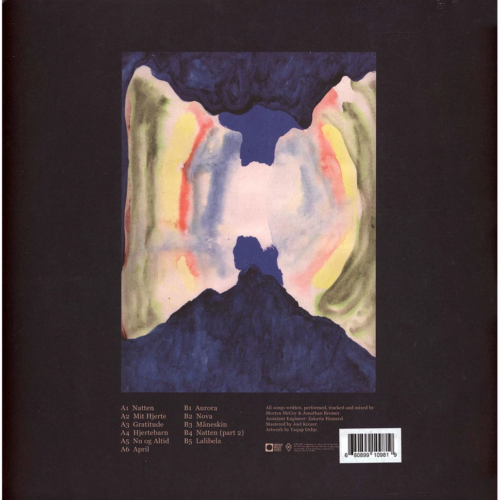
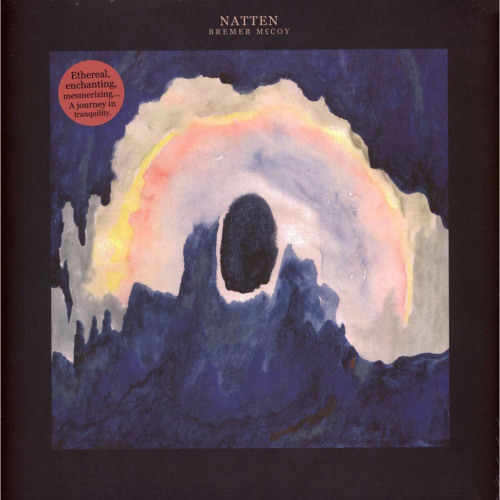 What were they up to? Nobody could tell—not even them. Bremer/McCoy recorded straight to tape so that they had as little time as possible to think about it. They just laid it down. They couldn’t really explain it. “When it works for me,” says pianist Morten McCoy, “it’s pure meditation, pure prayer. Pure gratitude for simply being, without all kinds of jibber-jabber filling my thoughts.” A sentiment that tells you everything about the feeling and nothing about the sound. McCoy and the bassist Jonathan Bremer started making music together back in 2012 when they were still in school. At first the Danish duo played dub. It’s hard to imagine that that’s how they started when you listen to the ethereal sounds they make now, but the influence becomes clearer when you see them live: they insist on traveling with their own sound system. For Bremer/McCoy, making music is all about what happens in the room. That’s why they go through the trouble of carrying their own equipment, and it’s why they record analog. When they write music, they aim for direct transmission—idea straight to composition. Natten, which means “The Night” in Danish, draws inspiration from the end of day, that regenerative time under the constellations when our lives look different. “We felt a greater freedom this time around because we now have a much deeper understanding and grounding in what we’re doing,” says Bremer. “This allows us to venture further out than ever before, because we know that things typically fall into place.”
What were they up to? Nobody could tell—not even them. Bremer/McCoy recorded straight to tape so that they had as little time as possible to think about it. They just laid it down. They couldn’t really explain it. “When it works for me,” says pianist Morten McCoy, “it’s pure meditation, pure prayer. Pure gratitude for simply being, without all kinds of jibber-jabber filling my thoughts.” A sentiment that tells you everything about the feeling and nothing about the sound. McCoy and the bassist Jonathan Bremer started making music together back in 2012 when they were still in school. At first the Danish duo played dub. It’s hard to imagine that that’s how they started when you listen to the ethereal sounds they make now, but the influence becomes clearer when you see them live: they insist on traveling with their own sound system. For Bremer/McCoy, making music is all about what happens in the room. That’s why they go through the trouble of carrying their own equipment, and it’s why they record analog. When they write music, they aim for direct transmission—idea straight to composition. Natten, which means “The Night” in Danish, draws inspiration from the end of day, that regenerative time under the constellations when our lives look different. “We felt a greater freedom this time around because we now have a much deeper understanding and grounding in what we’re doing,” says Bremer. “This allows us to venture further out than ever before, because we know that things typically fall into place.” -
Ausverkauft
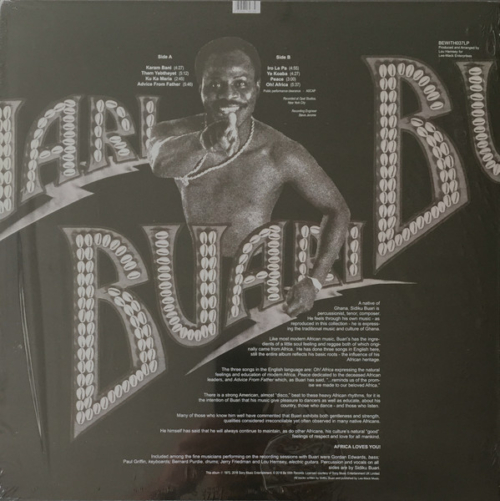
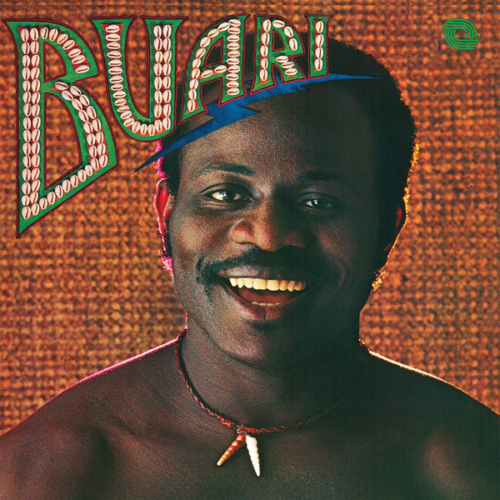 2022 repress A surefire Afro-Funk classic, long treasured by collectors across the globe, the fantastic self-titled LP from Ghanaian singing/percussion sensation Sidiku Buari nevertheless remains a criminally hard-to find gem. We're honoured to present the first ever officially licensed vinyl reissue of this undoubted masterpiece. Limited to just 500 copies. Originally released on RCA in 1975, this is, quite simply, a ridiculous record. This super-rare album boasts an all-star cast of top funk instrumentalists playing alongside Buari as he blends heavy African rhythms with American soul-funk grooves. The arrangements and the playing are incredibly tight and the album is stacked with killer tracks including "Advice From Father" (sampled brilliantly by Kenny Dope) and "Ku Ka Maria", with its intense, neck-snapping breaks and funky drumming from legend Bernard 'Pretty' Purdie. Purdie is in the pocket for the entirety of this stunning LP - the drumming is just straight out of hand, so varied yet so precise. It's not hard to fathom why these tracks have always been huge on the b-boy/breaking scene. Other standouts include the wonderful disco-tinged afro monsters "Karam Bani" and "Iro Le Pa" plus the cool laidback groove of "Them Yebtheyet". With access to the original analogue tape transfers, Simon Francis' stellar mastering elevates the sound throughout and, as ever, it has been pressed at a reassuringly weighty 180g.
2022 repress A surefire Afro-Funk classic, long treasured by collectors across the globe, the fantastic self-titled LP from Ghanaian singing/percussion sensation Sidiku Buari nevertheless remains a criminally hard-to find gem. We're honoured to present the first ever officially licensed vinyl reissue of this undoubted masterpiece. Limited to just 500 copies. Originally released on RCA in 1975, this is, quite simply, a ridiculous record. This super-rare album boasts an all-star cast of top funk instrumentalists playing alongside Buari as he blends heavy African rhythms with American soul-funk grooves. The arrangements and the playing are incredibly tight and the album is stacked with killer tracks including "Advice From Father" (sampled brilliantly by Kenny Dope) and "Ku Ka Maria", with its intense, neck-snapping breaks and funky drumming from legend Bernard 'Pretty' Purdie. Purdie is in the pocket for the entirety of this stunning LP - the drumming is just straight out of hand, so varied yet so precise. It's not hard to fathom why these tracks have always been huge on the b-boy/breaking scene. Other standouts include the wonderful disco-tinged afro monsters "Karam Bani" and "Iro Le Pa" plus the cool laidback groove of "Them Yebtheyet". With access to the original analogue tape transfers, Simon Francis' stellar mastering elevates the sound throughout and, as ever, it has been pressed at a reassuringly weighty 180g. -
Ausverkauft
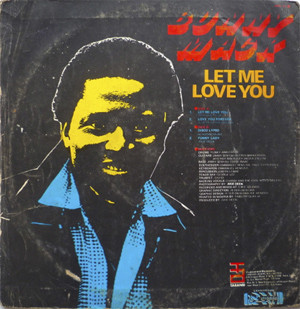
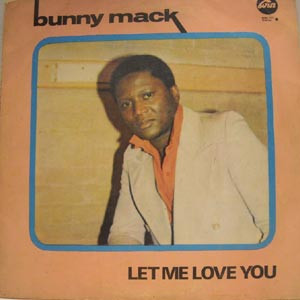 Used Vinyl Nigerian masterpiece! Check "Let Me Love You", an absolute hit! Record VG, surface noise but never overpowering the music. Nice one. VG/VG-
Used Vinyl Nigerian masterpiece! Check "Let Me Love You", an absolute hit! Record VG, surface noise but never overpowering the music. Nice one. VG/VG- -
Ausverkauft
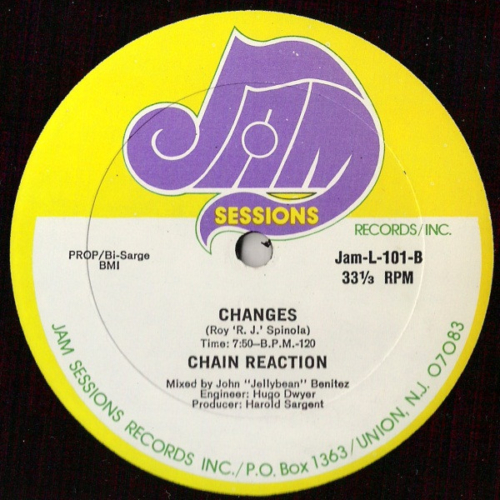
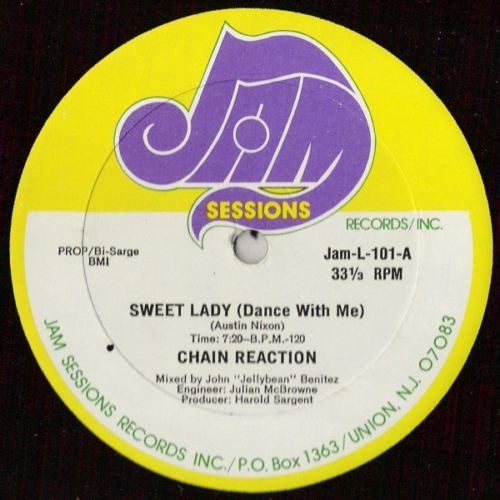 Used vinyl. VG+/VG+
Used vinyl. VG+/VG+ -
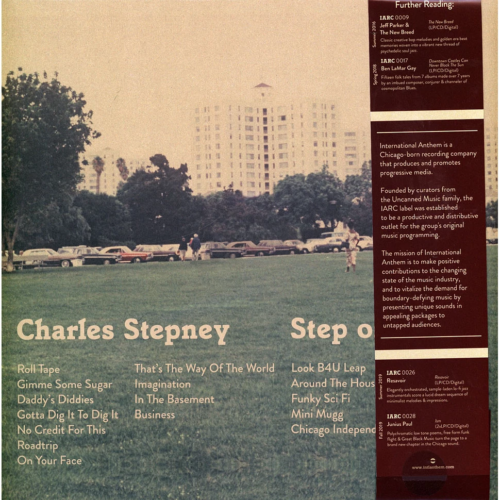
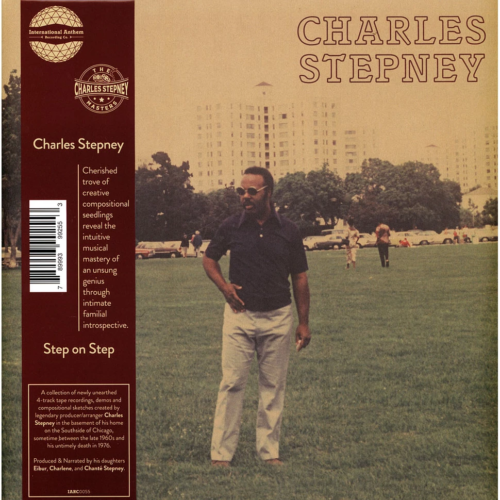 Chicago-born composer, producer and arranger Charles Stepney is known to some for his work with Earth, Wind & Fire, Deniece Williams, and Ramsey Lewis, or for his work with Chess Records in the 1960s, where he was an essential creative force behind seminal recordings by Rotary Connection, Minnie Riperton, Marlena Shaw, Muddy Waters, Howlin Wolf, Terry Callier, The Dells, The Emotions, and many many more. In the decades since his untimely death in 1976, the presence of his name in liner notes and on vinyl labels has become a seal of quality for record collectors, music historians, and aficionados, while his sound has been used by countless samplers in the hip-hop world including Kanye West, A Tribe Called Quest, The Fugees, MF Doom, and Madlib. But in comparison to the post-mortem renown of his sound, or the music he created and the artists he supported while he was alive, Stepney is a greatly under-appreciated figure... a genius relegated to the shadows.
Chicago-born composer, producer and arranger Charles Stepney is known to some for his work with Earth, Wind & Fire, Deniece Williams, and Ramsey Lewis, or for his work with Chess Records in the 1960s, where he was an essential creative force behind seminal recordings by Rotary Connection, Minnie Riperton, Marlena Shaw, Muddy Waters, Howlin Wolf, Terry Callier, The Dells, The Emotions, and many many more. In the decades since his untimely death in 1976, the presence of his name in liner notes and on vinyl labels has become a seal of quality for record collectors, music historians, and aficionados, while his sound has been used by countless samplers in the hip-hop world including Kanye West, A Tribe Called Quest, The Fugees, MF Doom, and Madlib. But in comparison to the post-mortem renown of his sound, or the music he created and the artists he supported while he was alive, Stepney is a greatly under-appreciated figure... a genius relegated to the shadows. -
Ausverkauft
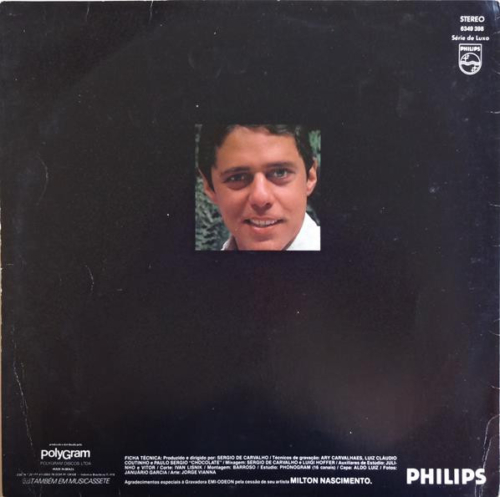
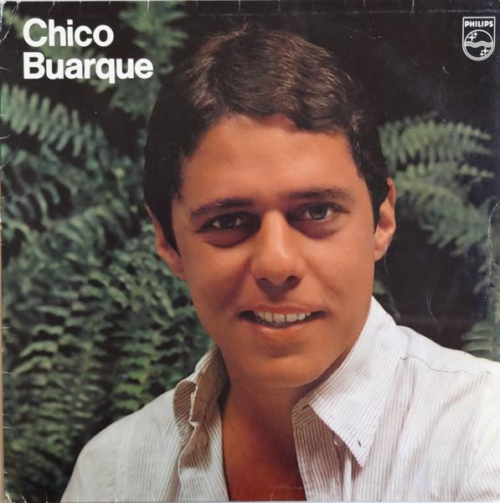 Used Vinyl Classic Chico Buarque. Check "Apesar De Você! VG+
Used Vinyl Classic Chico Buarque. Check "Apesar De Você! VG+ -
Ausverkauft
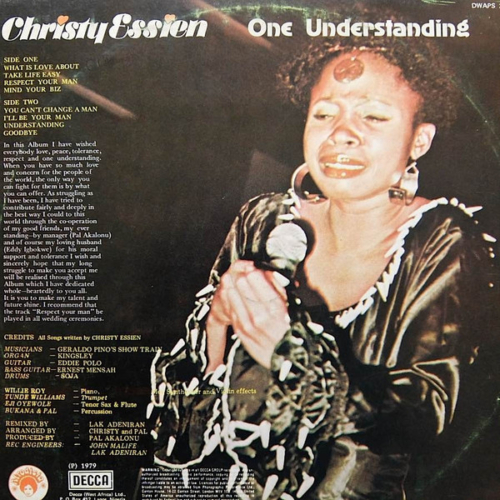
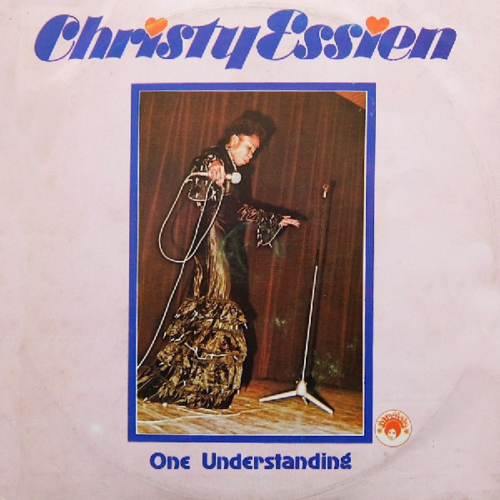 Used Vinyl Rare OG pressing of Nigerian Afro Boogie classic. Includes "You Can't Change A Man" & "Take Life Easy". Noisey but still enjoyable, no skips heard. G+/G+
Used Vinyl Rare OG pressing of Nigerian Afro Boogie classic. Includes "You Can't Change A Man" & "Take Life Easy". Noisey but still enjoyable, no skips heard. G+/G+ -
Ausverkauft
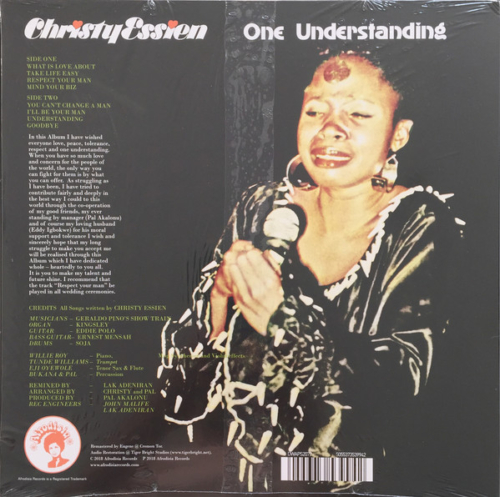
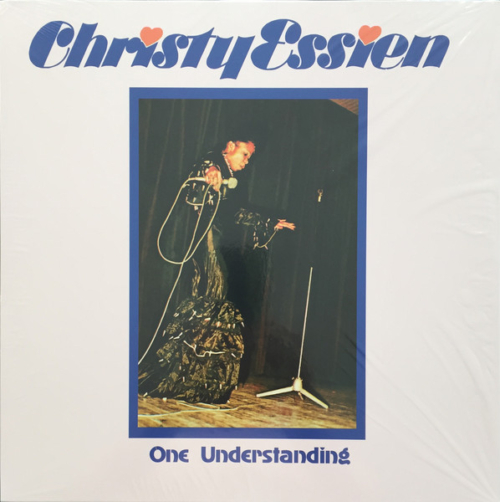 Used Vinyl Out of print repress of Nigerian classic. VG+/VG+
Used Vinyl Out of print repress of Nigerian classic. VG+/VG+ -
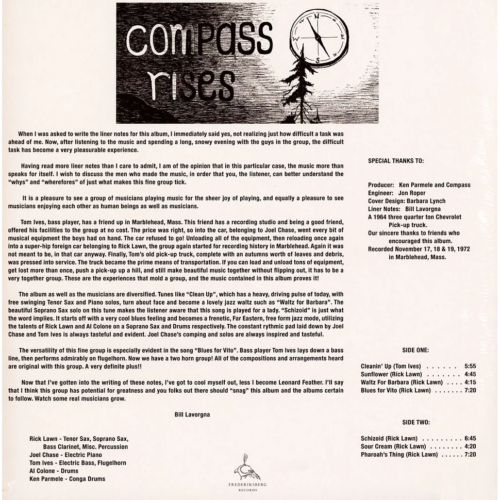
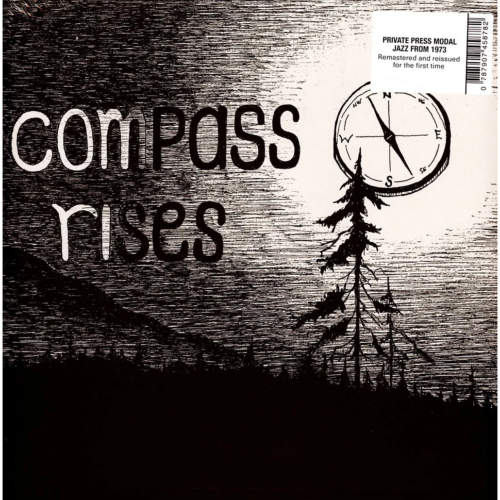 When arists self-releases their own recordings, they do so in the hopes that a hit might develop, or even better, a sphere of influence might form. In a lot of cases these records provide a stamp of existence and intent – a sonic business card showing what musicians were made of. Compass Rises (1973), the privately pressed sole LP by Oneonta, New York’s Compass, is both a sampling of versatility and a declaration of straight-ahead purpose. Regularly active in upstate New York between 1969 and 1974, Compass was an acoustic-electric quartet that played original music and modern jazz standards. The group consisted of saxophonist and bass clarinetist Rick Lawn, keyboardist Joel Chase, bassist Tom Ives (doubling on flugelhorn), and drummer Al Colone. On the LP, percussion duties were shared across the band as well as an conguero, Ken Parmele. Every song on Compass Rises, with the exception of the opener, is written and arranged by Lawn. The album is a nod to the post-Coltrane lineage of 1970’s jazz – even at its most spry there’s an undertow of workmanlike toughness, perhaps a reflection of the industrial-collegiate hybrid towns in New York where Compass plied their trade. Ives’ “Cleanin’ Up” starts the proceedings, a modal groover that would not have sounded out of place on a Joe Henderson Milestone LP, coupled with a neat, funky turnaround in the head. “Sunflower” has a slight Latin flavor and while it’s not exactly Freddie Hubbard’s “Little Sunflower,” it does have a lilt that’s both sinewy and breezy, with Lawn’s huskily burnished tenor shimmying atop. Following the ballad “Waltz for Barbara,” a front line expanded with Ives’ flugelhorn opens up on the driving “Blues for Vito,” dry and cracking rhythm supporting a tough, metallic dance. Side two begins with “Schizoid,” the nasally incision of Lawn’s soprano saxophone in spiraling turns against pummeling toms and Chase’s fuzzed-out intervallic sprawl. “Sour Cream” is a choppy bit of soul jazz, while the closing “Pharoah’s Thing” starts off on an elegiac plateau before unfurling with a piquant, minor-key bounce. With its stark, somewhat gothic cover art and toothy, inspired playing and composing, Compass Rises deserves the critical examination that it likely didn’t have upon release.
When arists self-releases their own recordings, they do so in the hopes that a hit might develop, or even better, a sphere of influence might form. In a lot of cases these records provide a stamp of existence and intent – a sonic business card showing what musicians were made of. Compass Rises (1973), the privately pressed sole LP by Oneonta, New York’s Compass, is both a sampling of versatility and a declaration of straight-ahead purpose. Regularly active in upstate New York between 1969 and 1974, Compass was an acoustic-electric quartet that played original music and modern jazz standards. The group consisted of saxophonist and bass clarinetist Rick Lawn, keyboardist Joel Chase, bassist Tom Ives (doubling on flugelhorn), and drummer Al Colone. On the LP, percussion duties were shared across the band as well as an conguero, Ken Parmele. Every song on Compass Rises, with the exception of the opener, is written and arranged by Lawn. The album is a nod to the post-Coltrane lineage of 1970’s jazz – even at its most spry there’s an undertow of workmanlike toughness, perhaps a reflection of the industrial-collegiate hybrid towns in New York where Compass plied their trade. Ives’ “Cleanin’ Up” starts the proceedings, a modal groover that would not have sounded out of place on a Joe Henderson Milestone LP, coupled with a neat, funky turnaround in the head. “Sunflower” has a slight Latin flavor and while it’s not exactly Freddie Hubbard’s “Little Sunflower,” it does have a lilt that’s both sinewy and breezy, with Lawn’s huskily burnished tenor shimmying atop. Following the ballad “Waltz for Barbara,” a front line expanded with Ives’ flugelhorn opens up on the driving “Blues for Vito,” dry and cracking rhythm supporting a tough, metallic dance. Side two begins with “Schizoid,” the nasally incision of Lawn’s soprano saxophone in spiraling turns against pummeling toms and Chase’s fuzzed-out intervallic sprawl. “Sour Cream” is a choppy bit of soul jazz, while the closing “Pharoah’s Thing” starts off on an elegiac plateau before unfurling with a piquant, minor-key bounce. With its stark, somewhat gothic cover art and toothy, inspired playing and composing, Compass Rises deserves the critical examination that it likely didn’t have upon release. -
Ausverkauft

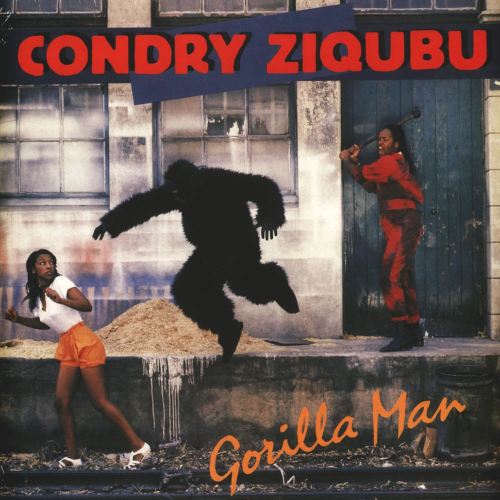 Four tracks by one of the biggest names in South African disco: Condry Ziqubu. A regular on the local soul scene since the late 1960s in groups such as The Flaming Souls, The Anchors and The Flaming Ghettoes, by the mid-80s he had qualified as a sangoma (traditional healer), recorded with Harari (the biggest group in the country at the time), fronted his own group Lumumba, and travelled the world as part of Caiphus Semenya and Letta Mbulu’s band. In 1986 he ditched Lumumba and released his first solo hit, ‘Gorilla Man’. Opening with an audacious 20-second intro, the song tells the story of a man preying on women in downtown Johannesburg. It highlights Condry’s winning formula of lyrics that touch on everyday South African issues and places (without drawing the attention of apartheid censors). Musically the song draws obvious influence from Piano Fantasia’s 1985 Euro-disco hit ‘Song for Denise’. Also included on this new anthology is another song from the same album, the politically charged ‘Confusion (Ma Afrika)’, as well as ‘Phola Baby’ from his 1988 album Pick Six – a call to men to “stop pushing your woman around … what kind of man are you?” – and ‘Everybody Party’ from 1989’s Magic Man, a straight-up party song with no political or social intimations, other than as a brief escape from the harsh reality of the time, one that still resonates today. Gorilla Man will be released on vinyl and digitally in early 2021 on Johannesburg-based Afrosynth Records (afs047), distributed worldwide by Rush Hour in Amsterdam.
Four tracks by one of the biggest names in South African disco: Condry Ziqubu. A regular on the local soul scene since the late 1960s in groups such as The Flaming Souls, The Anchors and The Flaming Ghettoes, by the mid-80s he had qualified as a sangoma (traditional healer), recorded with Harari (the biggest group in the country at the time), fronted his own group Lumumba, and travelled the world as part of Caiphus Semenya and Letta Mbulu’s band. In 1986 he ditched Lumumba and released his first solo hit, ‘Gorilla Man’. Opening with an audacious 20-second intro, the song tells the story of a man preying on women in downtown Johannesburg. It highlights Condry’s winning formula of lyrics that touch on everyday South African issues and places (without drawing the attention of apartheid censors). Musically the song draws obvious influence from Piano Fantasia’s 1985 Euro-disco hit ‘Song for Denise’. Also included on this new anthology is another song from the same album, the politically charged ‘Confusion (Ma Afrika)’, as well as ‘Phola Baby’ from his 1988 album Pick Six – a call to men to “stop pushing your woman around … what kind of man are you?” – and ‘Everybody Party’ from 1989’s Magic Man, a straight-up party song with no political or social intimations, other than as a brief escape from the harsh reality of the time, one that still resonates today. Gorilla Man will be released on vinyl and digitally in early 2021 on Johannesburg-based Afrosynth Records (afs047), distributed worldwide by Rush Hour in Amsterdam. -
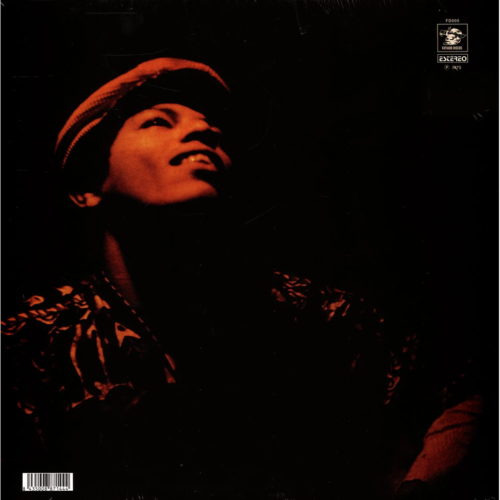
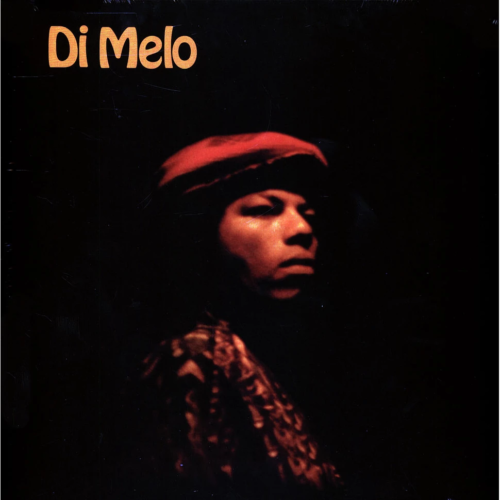 Di Melo's Debut Album Was Originally Released In 1975 And It's A Fusion Of Genuinely Brazilian Rhythms With Funk, Soul And The Right Amount Of Psychedelia. Di Melo Is One Of The Main Brazilian Soul Music Artists, Seen By Many As Talented And Musically Creative As His Peers Jorge Ben And Tim Maia.Di Melo Went Missing In Action From 1976 To 1997, The Year His Song "A Vida Em Seus Métodos Diz Calma" Was On The Collection "Blue Brazil" From Blue Note Record Label. The Word On The Streets Was That He Was Dead Until 2011, When The Documentary Called "Di Melo, O Imorrível" (Di Melo, The Immortal) Was Released. In This 2021 Edition The Album Contains The Original 1975 Insert With Lyrics Plus Photos From Personal Family Archives And For The First Time The Full Credits With All The Name Of Every Single Musician Who Took Part, Among Them, Hermeto Pascoal.The Young Man Of 25 Coming From The Outskirts Of Pernambuco Was At The Peak Of His Success. Psychedelic Drugs And Cinema References Were Blowing His Mind Away When He Realised That He Was Being Conned By Music Industry Rats. His Songs Were At The Hit Parade On The Radio And His Music Had Been Recorded By Some Of The Biggest Names In Brazil, But What He Was Being Paid For Made No Justice To That. People Say That After Watching The Movie "Blow Up" By Antonioni, Di Melo Himself Beat The S*** Out Of The Publisher Who Paid Him Less Than 10 Dollars For His Rights For The Past Three Months.Such Events, Ran By The Same Strong Personality That Initially Opened Doors, Made Di Melo Ostracized By The Ungrateful Brazilian Music Industry. Perhaps That's What It Took To Make Such A Mythical Album.
Di Melo's Debut Album Was Originally Released In 1975 And It's A Fusion Of Genuinely Brazilian Rhythms With Funk, Soul And The Right Amount Of Psychedelia. Di Melo Is One Of The Main Brazilian Soul Music Artists, Seen By Many As Talented And Musically Creative As His Peers Jorge Ben And Tim Maia.Di Melo Went Missing In Action From 1976 To 1997, The Year His Song "A Vida Em Seus Métodos Diz Calma" Was On The Collection "Blue Brazil" From Blue Note Record Label. The Word On The Streets Was That He Was Dead Until 2011, When The Documentary Called "Di Melo, O Imorrível" (Di Melo, The Immortal) Was Released. In This 2021 Edition The Album Contains The Original 1975 Insert With Lyrics Plus Photos From Personal Family Archives And For The First Time The Full Credits With All The Name Of Every Single Musician Who Took Part, Among Them, Hermeto Pascoal.The Young Man Of 25 Coming From The Outskirts Of Pernambuco Was At The Peak Of His Success. Psychedelic Drugs And Cinema References Were Blowing His Mind Away When He Realised That He Was Being Conned By Music Industry Rats. His Songs Were At The Hit Parade On The Radio And His Music Had Been Recorded By Some Of The Biggest Names In Brazil, But What He Was Being Paid For Made No Justice To That. People Say That After Watching The Movie "Blow Up" By Antonioni, Di Melo Himself Beat The S*** Out Of The Publisher Who Paid Him Less Than 10 Dollars For His Rights For The Past Three Months.Such Events, Ran By The Same Strong Personality That Initially Opened Doors, Made Di Melo Ostracized By The Ungrateful Brazilian Music Industry. Perhaps That's What It Took To Make Such A Mythical Album. -
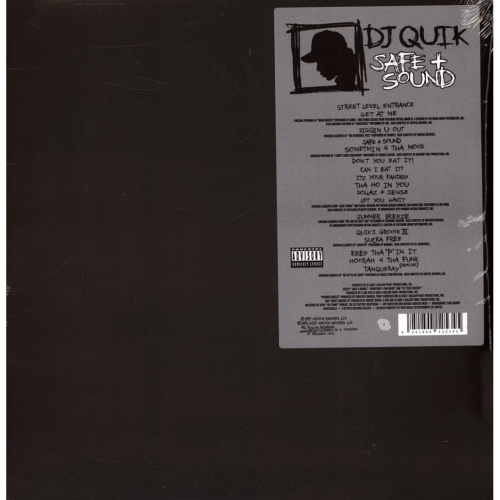 DJ Quik is a giant of West Coast hip-hop. With 1995’s Safe + Sound, he scaled new levels of musical magnificence with his signature new age P-Funk/laconic G-Funk. A quintessential, sun-scorched LA album, this is pretty much essential. Typical for mid-90s albums the original vinyl copies are now rare so here’s the Be With re-issue, complete with “Tanqueray”, the hidden track from the original CD release. A preternaturally gifted producer/rapper, DJ Quik has produced scores of LA gangsta rap classics. He’s released platinum and gold records of his own, as well as helped craft them for the likes of Tupac, Snoop Dogg, and Dr Dre. Quik has always been quirkier and more interesting than his gangsta rap peers, both musically and lyrically. An old-school funk producer at heart, he’s also incredibly nice on the mic. His raps often deal in boasts, jokes and good times but also cover his beefs, his trials and his trauma. Partying and pain, all mixed up. DJing and producing hype beat tapes from age 14, Quik’s tracks blended the languid funk and rubbery synths of Zapp and George Clinton with a gangsta aesthetic, creating a more danceable foil to Compton’s more typical nihilistic hedonism.
DJ Quik is a giant of West Coast hip-hop. With 1995’s Safe + Sound, he scaled new levels of musical magnificence with his signature new age P-Funk/laconic G-Funk. A quintessential, sun-scorched LA album, this is pretty much essential. Typical for mid-90s albums the original vinyl copies are now rare so here’s the Be With re-issue, complete with “Tanqueray”, the hidden track from the original CD release. A preternaturally gifted producer/rapper, DJ Quik has produced scores of LA gangsta rap classics. He’s released platinum and gold records of his own, as well as helped craft them for the likes of Tupac, Snoop Dogg, and Dr Dre. Quik has always been quirkier and more interesting than his gangsta rap peers, both musically and lyrically. An old-school funk producer at heart, he’s also incredibly nice on the mic. His raps often deal in boasts, jokes and good times but also cover his beefs, his trials and his trauma. Partying and pain, all mixed up. DJing and producing hype beat tapes from age 14, Quik’s tracks blended the languid funk and rubbery synths of Zapp and George Clinton with a gangsta aesthetic, creating a more danceable foil to Compton’s more typical nihilistic hedonism. -
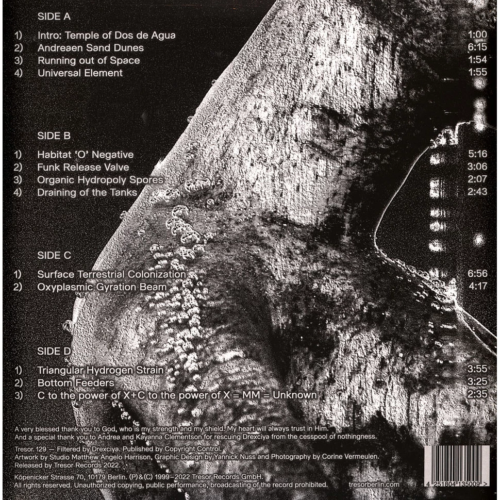
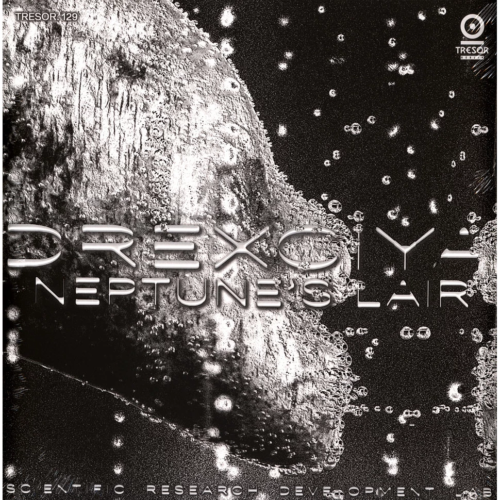 Tresor Records announces forthcoming special editions of its entire catalogue of Drexciya and related projects. 2022 marks the 20th anniversary of the passing of James Stinson and the releases of the Transllusion and Shifted Phases albums. In recognition, the rightsholders, their families, and the label have commissioned Detroit-based contemporary artist Matthew Angelo Harrison to re-conceptualize the covers of Tresor's Drexciya-related catalogue. These editions will be released sequentially, bimonthly, starting early-September 2022. The series starts with Neptune's Lair, first released in 1999, with the Hydro Doorways single arriving shortly after. In November, Harnessed The Storm and Digital Tsunami are coming. In 2023 comes the release of Transllusion in February. The series is completed by the long-awaited re-release of Shifted Phases - The Cosmic Memoirs Of The Late Great Rupert J. Rosinthrope - at the end of March. These records, individually and as a catalogue, represent some of the most crucial moments in the Tresor label history, with the sound and mythic world of Drexciya undoubtedly inspiring generations.
Tresor Records announces forthcoming special editions of its entire catalogue of Drexciya and related projects. 2022 marks the 20th anniversary of the passing of James Stinson and the releases of the Transllusion and Shifted Phases albums. In recognition, the rightsholders, their families, and the label have commissioned Detroit-based contemporary artist Matthew Angelo Harrison to re-conceptualize the covers of Tresor's Drexciya-related catalogue. These editions will be released sequentially, bimonthly, starting early-September 2022. The series starts with Neptune's Lair, first released in 1999, with the Hydro Doorways single arriving shortly after. In November, Harnessed The Storm and Digital Tsunami are coming. In 2023 comes the release of Transllusion in February. The series is completed by the long-awaited re-release of Shifted Phases - The Cosmic Memoirs Of The Late Great Rupert J. Rosinthrope - at the end of March. These records, individually and as a catalogue, represent some of the most crucial moments in the Tresor label history, with the sound and mythic world of Drexciya undoubtedly inspiring generations. -
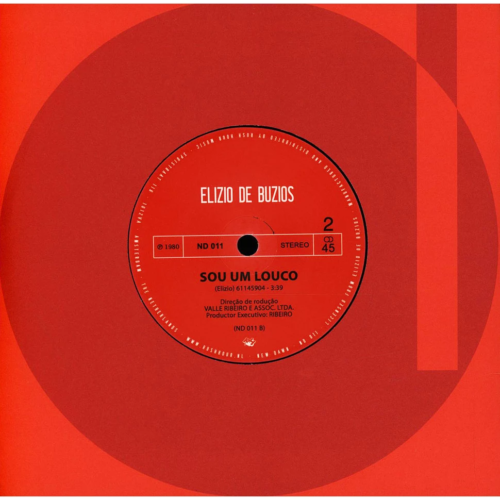
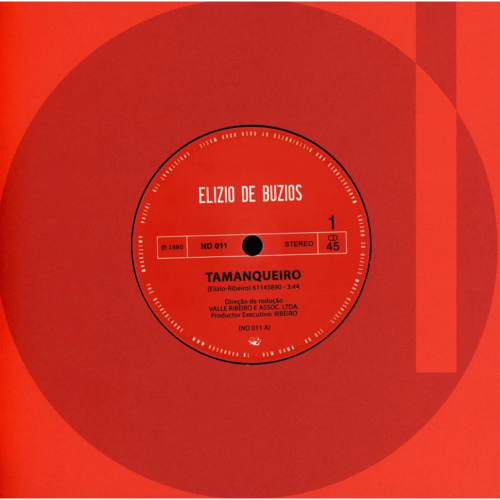 Reissue of Elizio De Buzios's "Tamanquiro". Remastered and pressed on 45 RPM! Sitting a good 90-minute drive away from Rio de Janeiro’s crowded beaches and packed tourist hot-spots, Campo Grande is not a neighbourhood that attracts travellers from around the World. Traditionally it is home to the city’s lower middle-class, whose aspirations of moving up the social ladder were played out in a suburb that has always been solidly working-class. Campo Grande is home to Elizio De Buzios, a Brazilian musician who started playing music in the late 1970s and early 1980s. De Buzios began as a drummer, before learning to play guitar and starting to compose and sing his own music. When he turned 18, De Buzios joined a local band formed by some of his friends and other like-minded local musicians: Sol da Terra. The band mostly played samba in neighbourhood bars and small venues around Camp Grande, but De Buzios was interested in more than just samba. While he naturally admired great samba composers such as Cartola and Beth Carvalho, his musical pass went far beyond Brazil’s national music. He also loved MPB and bossa-nova and at home he listed to Joäo Bosco, Milton Nascimento, Luis Melodia, Tom Jobim, and many bossa-nova singers. In 1980 De Buzios was noticed by a local representative of international major label Polygram, who gave him the opportunity to record two songs. He was excited, so started searching for inspiration for the songs he would eventually lay down. He found that inspiration close to home while passing a neighbourhood shop which made and sold clogs. After noticing a display of then fashionable Portuguese clogs outside the store, De Buzios popped inside to talk to the owner. It turned out that he was a tamanqueiro – as clog-makers are traditionally called in his native Portugal – and was as passionate about music as he was about the footwear he made. Thus inspired, De Buzios returned home to work more on the lyrics and music. The next day, he headed into the studio to record the song, with Vale Ribeiro, who later went on to produce tracks for Marcos Valle, behind the desk. With Ribeiro’s assistance, De Buzios managed to record two songs in one day: ‘Tamanqueiro’ and ‘Sou Um Louco’, a ballad with English lyrics blended into the mostly Portuguese text. From the start, it was clear that ‘Tamanqueiro’ would be the single’s A-side. Incredibly catchy and funky, with some subtle disco elements, the song remained distinctively Brazilian thanks to the use of the cuíca. Listening back all these years on, De Buzios’ lyrics seem almost spontaneous, carry the track forward, and make it almost impossible not to sing along. Its infectiousness and funkiness made it an instant hit with the first few people to hear it. When it was released, responses to the song were enthusiastic, even if it never became the Brazil-wide smash it should have been. It resonated well in the local clubs and on the radio, but unfortunately the marketing was handled by an inexperienced Polygram employee who failed to adequately promote the track. As a result, the record sank without trace and De Buzios’ dreams of stardom evaporated. Having just started a family, he realized he could not live off the uncertainty of being a musician. Instead, he got a job at city hall as a civil servant, a role he continued until his retirement a few years ago. ‘Tamanqueiro’ and ‘Sou Um Louco’ remain the only two songs he ever recorded. In the early 2000s, with the rise of diggers’ culture, ‘Tamanqueiro’ slowly surfaced again. It became a sought after, hard to find seven-inch single, finding its way onto the airwaves once more and into the ears of a new generation of listeners. Some started appreciating the song so much that it was referred to as the “best-Jorge-Ben-song-Jorge-Ben-never-recorded”. And they are right: ‘Tamanqueiro’ does have that Jorge Ben-straight-forwardness. It’s a completely honest song that’s almost impossible not to fall in love with. Thanks to this remastered reissue on Rush Hour, De Buzios may now get the props his sole record so richly deserves. Now for the good news: De Buzios is still singing in local bars and clubs in and around Campo Grande. He is surprised, but also incredibly proud, that the record he had almost forgotten about is appreciated so much by a group of music lovers he didn’t even know existed. But above all, he is happy that more than 40 years after the recording session, the record lives on – not only on this re-release, but also in his weekend sets in the bars of Campo Grande.
Reissue of Elizio De Buzios's "Tamanquiro". Remastered and pressed on 45 RPM! Sitting a good 90-minute drive away from Rio de Janeiro’s crowded beaches and packed tourist hot-spots, Campo Grande is not a neighbourhood that attracts travellers from around the World. Traditionally it is home to the city’s lower middle-class, whose aspirations of moving up the social ladder were played out in a suburb that has always been solidly working-class. Campo Grande is home to Elizio De Buzios, a Brazilian musician who started playing music in the late 1970s and early 1980s. De Buzios began as a drummer, before learning to play guitar and starting to compose and sing his own music. When he turned 18, De Buzios joined a local band formed by some of his friends and other like-minded local musicians: Sol da Terra. The band mostly played samba in neighbourhood bars and small venues around Camp Grande, but De Buzios was interested in more than just samba. While he naturally admired great samba composers such as Cartola and Beth Carvalho, his musical pass went far beyond Brazil’s national music. He also loved MPB and bossa-nova and at home he listed to Joäo Bosco, Milton Nascimento, Luis Melodia, Tom Jobim, and many bossa-nova singers. In 1980 De Buzios was noticed by a local representative of international major label Polygram, who gave him the opportunity to record two songs. He was excited, so started searching for inspiration for the songs he would eventually lay down. He found that inspiration close to home while passing a neighbourhood shop which made and sold clogs. After noticing a display of then fashionable Portuguese clogs outside the store, De Buzios popped inside to talk to the owner. It turned out that he was a tamanqueiro – as clog-makers are traditionally called in his native Portugal – and was as passionate about music as he was about the footwear he made. Thus inspired, De Buzios returned home to work more on the lyrics and music. The next day, he headed into the studio to record the song, with Vale Ribeiro, who later went on to produce tracks for Marcos Valle, behind the desk. With Ribeiro’s assistance, De Buzios managed to record two songs in one day: ‘Tamanqueiro’ and ‘Sou Um Louco’, a ballad with English lyrics blended into the mostly Portuguese text. From the start, it was clear that ‘Tamanqueiro’ would be the single’s A-side. Incredibly catchy and funky, with some subtle disco elements, the song remained distinctively Brazilian thanks to the use of the cuíca. Listening back all these years on, De Buzios’ lyrics seem almost spontaneous, carry the track forward, and make it almost impossible not to sing along. Its infectiousness and funkiness made it an instant hit with the first few people to hear it. When it was released, responses to the song were enthusiastic, even if it never became the Brazil-wide smash it should have been. It resonated well in the local clubs and on the radio, but unfortunately the marketing was handled by an inexperienced Polygram employee who failed to adequately promote the track. As a result, the record sank without trace and De Buzios’ dreams of stardom evaporated. Having just started a family, he realized he could not live off the uncertainty of being a musician. Instead, he got a job at city hall as a civil servant, a role he continued until his retirement a few years ago. ‘Tamanqueiro’ and ‘Sou Um Louco’ remain the only two songs he ever recorded. In the early 2000s, with the rise of diggers’ culture, ‘Tamanqueiro’ slowly surfaced again. It became a sought after, hard to find seven-inch single, finding its way onto the airwaves once more and into the ears of a new generation of listeners. Some started appreciating the song so much that it was referred to as the “best-Jorge-Ben-song-Jorge-Ben-never-recorded”. And they are right: ‘Tamanqueiro’ does have that Jorge Ben-straight-forwardness. It’s a completely honest song that’s almost impossible not to fall in love with. Thanks to this remastered reissue on Rush Hour, De Buzios may now get the props his sole record so richly deserves. Now for the good news: De Buzios is still singing in local bars and clubs in and around Campo Grande. He is surprised, but also incredibly proud, that the record he had almost forgotten about is appreciated so much by a group of music lovers he didn’t even know existed. But above all, he is happy that more than 40 years after the recording session, the record lives on – not only on this re-release, but also in his weekend sets in the bars of Campo Grande.
